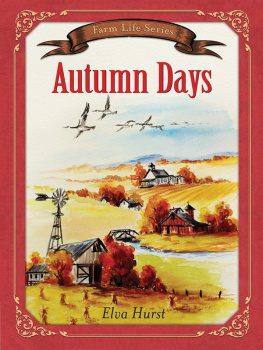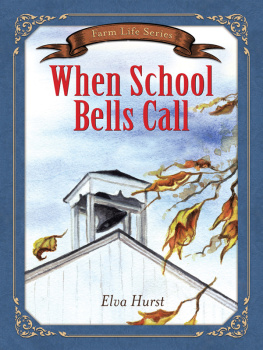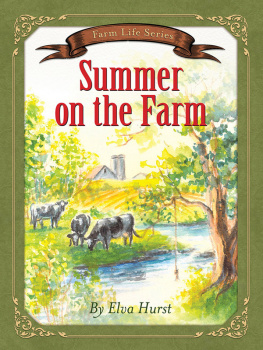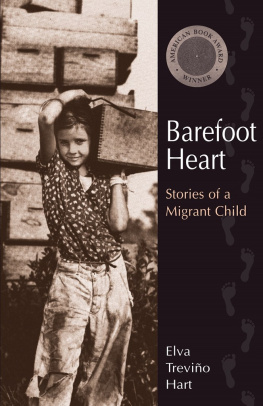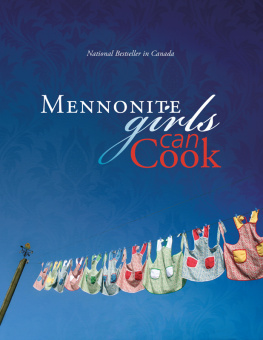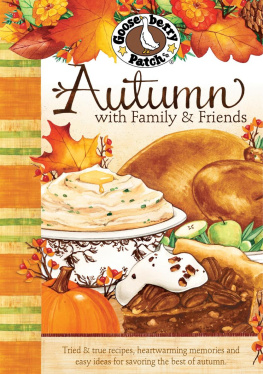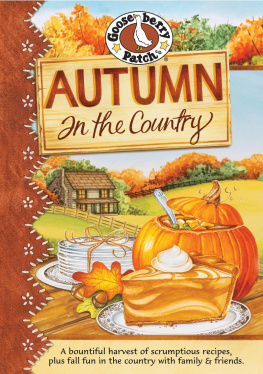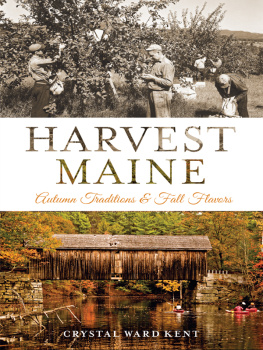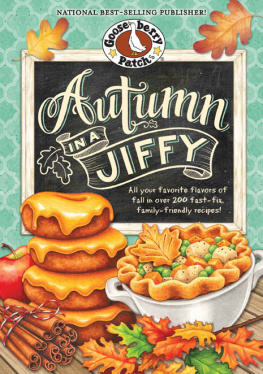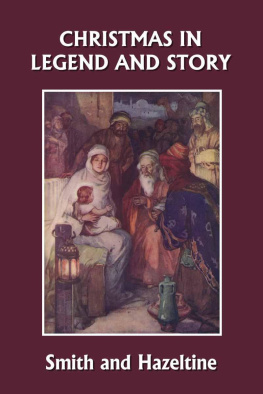

HARVEST HOUSE PUBLISHERS
EUGENE, OREGON
Cover by Aesthetic Soup, Shakopee, Minnesota
AUTUMN DAYS
Copyright 2015 Elva Hurst; Illustrations by Elva Hurst
Published by Harvest House Publishers
Eugene, Oregon 97402
www.harvesthousepublishers.com
Library of Congress Cataloging-in-Publication Data
Hurst, Elva, 1968- author, illustrator.
Autumn days / Elva Hurst.
pages cm. (Farm life series)
Summary: On a Mennonite farm at harvest time, every family member, including Elva, helps gather fruits and vegetables then pitches in to preserve the bounty, but much can happen between chores as Elva decides to teach herself to play her brothers guitar and Teacher plans a sleepover. Based on a true story.
ISBN 978-0-7369-6094-6 (pbk.)
ISBN 978-0-7369-6095-3 (eBook)
[1. Farm lifePennsylvaniaFiction. 2. AutumnFiction. 3. HarvestingFiction. 4. MennonitesFiction. 5. Family lifePennsylvaniaFiction. 6. Lancaster County (Pa.)Fiction.]
I. Title.
PZ7.H95687Aut 2015
[Fic]dc23
2014022639
All rights reserved. No part of this electronic publication may be reproduced, stored in a retrieval system, distributed, or transmitted in any form or by any meanselectronic, mechanical, digital, photocopy, recording, or any otherwithout the prior written permission of the publisher. The authorized purchaser has been granted a nontransferable, nonexclusive, and noncommercial right to access and view this electronic publication, and purchaser agrees to do so only in accordance with the terms of use under which it was purchased or transmitted. Participation in or encouragement of piracy of copyrighted materials in violation of authors and publishers rights is strictly prohibited.
Thanks, Mom, for teaching me homemaking and food preservation skills.
My husband and children, thank you too!
Contents

These true stories recall my happy childhood days growing up in a large, loving Mennonite family. We lived in Lancaster County, Pennsylvania, in a community made up of many Amish and other Mennonite families who shared the big and small events of our lives.
The half-mile walk home from the one-room schoolhouse during the autumn was very pleasant. Usually I walked along the road with my siblings and classmates, but because the crops in the field across the road from the schoolhouse were harvested, my friend Linda, her sisters, and I decided to take the shortcut through the neighbors field.
At the end of the field, a fence marked the boundary line between two farms. I said good-bye to Linda and her sisters as they ducked under the fence and slid down the bank and into their pasture. Waving goodbye, I watched them cross to the other side of the creek on a fallen log that made a natural bridge.
I turned to the right to take the trail through the woods toward home. As I entered the woods, I remembered my summers-end walk and the fears and worries I had about the new school year. But now, somehow, everything I had worried about had worked itself out. Funny how the woods had changed with the new season, and so too had my feelings about the summer days ending. Now I was glad for autumn days.
Fallen leaves made a brightly colored path for my feet as I walked. When I took a deep breath, I noticed the smells of the woods had changed too. I followed the trail through the woods until it ended at the road by a bridge. I leaned over the rails of the bridge and watched the leaves float on the water, continue under the bridge, and disappear downstream. The leaves seemed to be in a race to reach the bridge first, and I hoped the red leaves would win.
I knew better than to linger too long. There was work to be done at home. At school we were never assigned homework, and I was glad for that so I could focus instead on what was happening at home.
When I entered the yard, Jackie, our faithful German shepherd watchdog, began to bark viciously. I turned just in time to see a darkly clothed figure emerge cautiously from around the silo. I hurried to the house and called for Mom. My anxious voice brought her quickly to the door. I watched her face intently as she peered through the screen door. I suddenly felt afraid. Dad wasnt at home, and for many reasons I always felt safer when Dad was around.
Jackie barked and pulled against her chain. The cats fled the porch as the stranger approached the house. Ach, Mom said in Pennsylvania Dutch, its just the hobo!
Id never seen a hobo before.
Mom stepped out on the porch, invited the hobo to have a seat on the lawn chair, and offered to bring him something to eat. I watched as Mom warmed up leftovers and put them on an old tin plate she kept in the back corner of the cupboard just for hobos. He grunted thank-you when she handed him the meal and ate it as if he had not eaten for a while. He looked old and tired, and his black overcoat was tattered and fringed at the sleeves.
I wasnt the only one watching the hobo. Our black house cat approached him cautiously, hoping for a share of the free meal. When she reached up to his plate with her paw, the hobo roughly pushed her away.
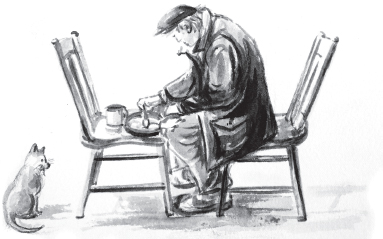
From inside the screen door, I watched and wondered what it would be like to be homeless. When the hobo finished his meal, he left the empty plate on the chair and returned to the barn to spend the night in the haymow.
There used to be a lot of hobos around, Dad told us later during supper. Why, when you all were little, he said pointing at my older brothers, on chilly nights theyd gather down in the quarry where they were shielded from the wind. There they kept themselves warm by huddling up close to a bonfire. When the weather got colder, they showed up at the farm regularly to help harvest the tobacco and spend the night in the warm tobacco-stripping room. I always made them hand over their matches first. I didnt want to take the chance of having a barn-fire mishap. In the summertime they were a handy help during haying time. They offered to work for food.
Dad went on to tell us about Sam King Cole, a boxcar hobo. Sam had come from the west and claimed to have traveled the world. He always had many tales to tell. Since backpacks had not been invented yet, the hobos put their belongings in a shirt, tied the shirt to a stick, and carried it over their shoulder as they walked the countryside.
Shorty Schaefer was another local hobo. Even after the Social Security system had taken care of some of the homeless problem, Shorty continued in his old way of life. He lived and died a hobo.

That night I had a little trouble going to sleep. I was very comfortable in my bed. I was snug and warm under Moms homemade quilts, but I wondered what it would be like to sleep in the hay. I figured it would itch. I wondered if the hobo had a blanket or if he covered himself with the hay.
The next morning there was no sign of the hobo. I figured he must have gotten an early start and was on his way again, traveling the countryside from farm to farm.
One day at school, Teacher called several boys and me to her desk. Making my way to the front, I wondered what could be wrong.
Your penmanship is very poor. Youll need to practice your handwriting skills, she explained to us. She checked to see if we were holding our pencils properly and then handed us several sheets of ruled paper. She told us to fill the paper with sentences and practice writing our full names in cursive.
Next page
